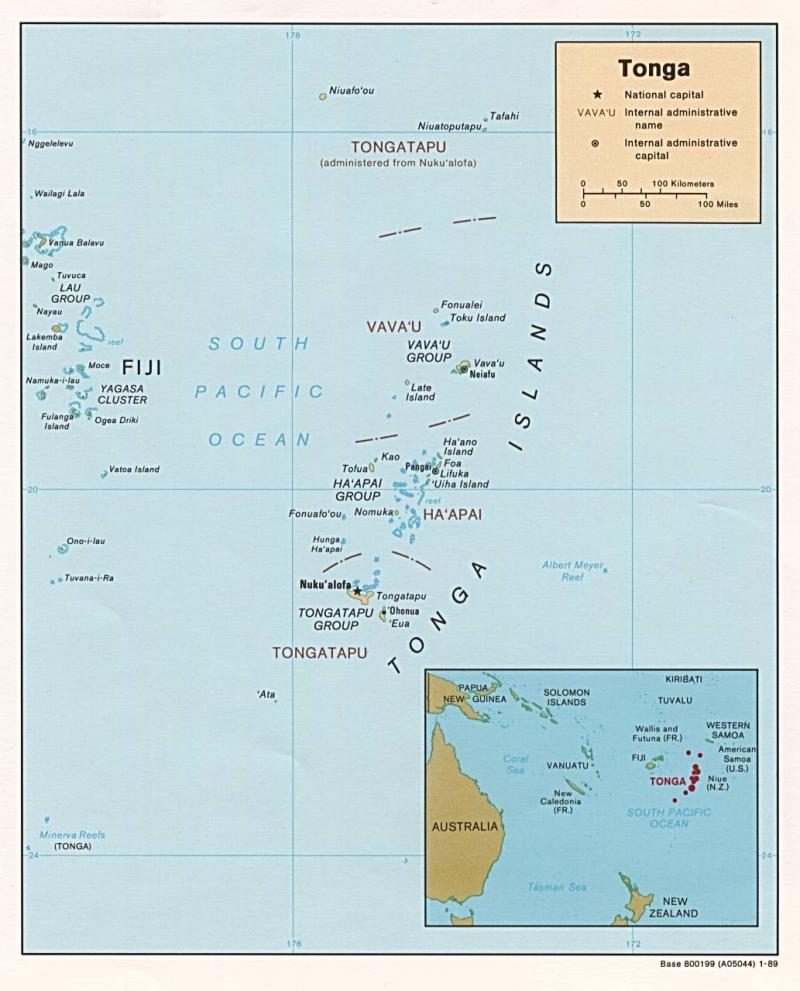Facts and figures
| Official name | Kingdom of Tonga |
| Country code | TO |
| Area | 747km2 |
| Coastline | 419km |
| Population | 105,697 |
| Capital city | Nuku'alofa |
| Timezone | UTC+13:00 |
| GDP | $USD 0.50 billions |
| Currency | TOP (Tongan paʻanga T$) |
| Government type | Constitutional Monarchy |
| Notable people |
|
The ‘Know Your Region’ series is designed to support unit and individual professional military education on the South East Asian region. It’s important for all serving members of our military to have a foundational knowledge of the countries and issues in the Indo-Pacific.
On this Page:
- Overview
- People and Society
- Religion
- National Psyche
- Media and Internet
Overview
The Kingdom of Tonga is a country located in the South Pacific in the Polynesian group of islands. It is made up of a total of 176 islands, 36 of which are inhabited. The total population of Tonga sits at approximately 106,000 people (2023), which are divided into four main island groups – Tongatapu, Ha’Apai, Vava’u, and the Niuas with the capital Nuku’alofa located on the main island of Tongatapu.

People and Society
The vast majority of the population identify as ethnic Tongans (97% as of 2016) and are of Polynesian descent. There is also some Melanesian influence in Tonga due to the country's proximity to Fiji. The primary spoken and official language is Tongan, an Oceanic language. Due to the country’s seventy years as a British protectorate, English is also widespread throughout Tonga and continues to be taught in primary and most high schools.
Gender and age play a critical role in determining the social status of an individual within the family and community. Tonga is traditionally matriarchal, meaning women hold higher social standing than men. At a young age, brothers are considered subordinate to their sisters, and there is an expectation upon the eldest daughter to be a leader. The father traditionally provides the family's income and can inherit titles and land for subsistence farming. Woman traditionally perform household duties and look after the children.
Kinship ties have paramount importance in Tongan society. In addition to immediate family, extended family are often very close. For example, a Tongan will usually refer to all their maternal aunts as ‘mother’ and all paternal uncles as ‘father’. Cousins are also thought of as brothers or sisters.
Interaction between boys and girls are usually limited until early adulthood. Generally speaking, men are expected to marry those of the same social status, while women can freely choose whom they marry. Weddings are a time of great celebration. A civil ceremony precedes the religious one and, by law, all marriages must be confirmed by a registered church official. During the wedding, the two extended families participate in an exchanging of mats and goods.
In Tongan society there is a strong sense of collectivism which drives people to share their success with their family group. Having surplus resources such as food is considered a blessing that should be shared with others.
Religion
Christianity is a key component of Tongan culture after being introduced by western missionaries in the late 1700s to early 1800s. Almost all modern-day Tongans identify with some form of Christian belief system. 2.4% identify with another form of religion and only 0.05% report no religion. The day of the Sabbath is practiced widely and enforced across society with only essential work able to be undertaken.
National Psyche
The concept of ‘angafakatonga’ (the Tongan way) encompasses all Tongan values, practices, beliefs, and behaviours. The Tongan way demands respect for those of a higher social status, the church, and loyalty to one’s family. The differences between the Tongan way and the Western way have forced some younger Tongans to be distanced from the Tongan way compared to older generations. This is in part due to younger Tongans migrating to western countries in search of better employment opportunities. The Tongan way is associated with agriculture and a harder way of life. For many, preserving connections to their family, heritage, and customs is essential; however, there is a fine balance between maintaining old customs and traditions and integrating with the western way.
A longstanding and highly cherished tradition in Tonga is mat weaving – Ngatu (making cloth from mulberry tree bark). It is common for women to get together to weave mats and have conversations. Mats are traditionally given during special occasions, such as births, weddings, and funerals. Tongans also wear mats around their waist, and those ceremonial mats are passed down from generation to generation. In times past, the wealth of the family was largely determined by the number and quality of mats they possessed.
Media and Internet
As of 2023 there were 76,800 internet users in Tonga which represents approximately 71% of the total population. Tonga has a number of state- and privately-owned radio stations, magazines, and newspapers. It also has a state-owned television station – the Tonga Broadcasting Commission. The China Central Television (CCTV) broadcast on a second channel of the Tonga Broadcasting Commission provides free to air Chinese news and culture.
For further information on Tonga, see the resources below:
- Articles
For Tongan language courses, take a look at this Cove article.
Know your region
Know Your Region series gives you a shortcut to understanding other nations in the Indo-Pacific region.









